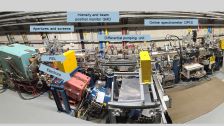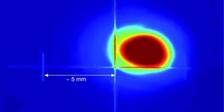The most important diagnostic units used to optimize the FEL beam are marked.
The detectors measure the intensity, position, spectrum, spatial profile, and arrival time of the FEL pulses.
Most experiments need online information on the intensity, spectral distribution, and temporal structure of the FEL pulses. This is achieved by using non-destructive diagnostic tools operating in parallel. Due to the SASE-specific shot-to-shot fluctuations, pulse-resolved diagnostics are mandatory.
Before and during the separation of beamlines, the FEL radiation passes a set of photon diagnostics and beam manipulation tools, such as a set of four gas-monitor detectors (GMD) for intensity and beam position determination, an attenuation system based on gas absorption, a set of filters, and a fast shutter. Beamlines FL11 and FL12 are equipped with a variable-line-spacing spectrograph as well as a detector system based on photoelectron and -ion spectroscopy for online determination of the FLASH wavelength spectrum in parallel to the user experiments (OPIS).
In the accelerator tunnel additional photon diagnostics are installed for the FLASH operators when setting up the machine after maintenance and for tuning of the beam. For example, it is crucial to ensure pointing stability of the FEL beam and optimum focusing at the experimental stations. For this purpose a Ce:YAG fluorescent crystal with a laser-engraved cross is incorporated in detector unit 2 in the tunnel. Centering the beam on this cross ensures that it can accurately propagate across all mirrors towards the experiments.
Reference:
K. Tiedtke et al., The soft X-ray free-electron laser FLASH at DESY: beamlines, diagnostics, and end stations, New J. Phys. 11, 023029 (2009);
http://dx.doi.org/10.1088/1367-2630/11/2/023029
An up to date summary of reference papers for the FLASH beamlines, endstations and diagnostic instrumentation can be found here.







